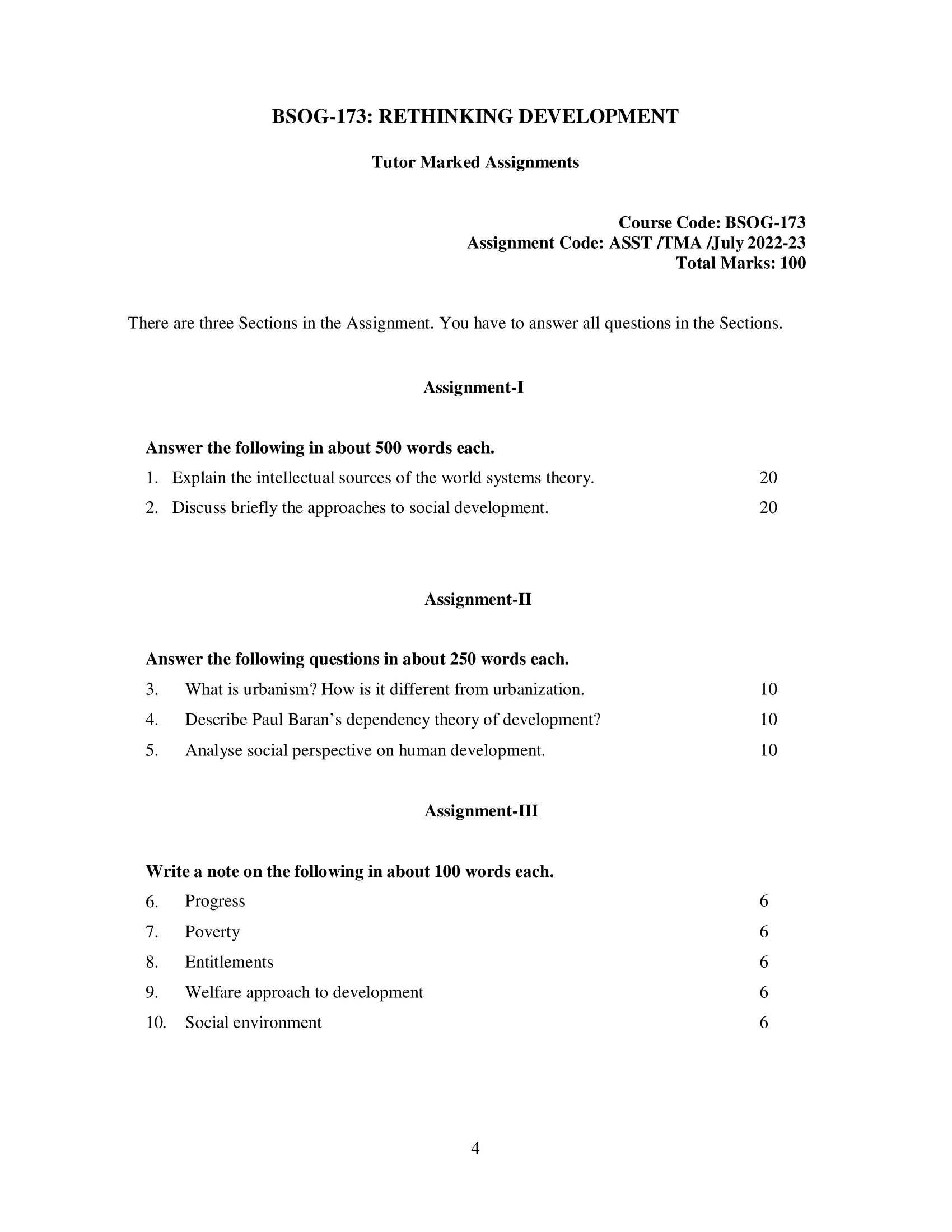
| Title | IGNOU: BSOG 173 Solved Assignment 2022-2023 (RETHINKING DEVELOPMENT) |
| University | IGNOU |
| Degree | Bachelor Degree Programme |
| Course Code | BSOG 173 |
| Course Name | RETHINKING DEVELOPMENT |
| Programme Name | Bachelor of Arts (General) |
| Programme Code | BAG |
| Total Marks | 100 |
| Year | 2022-2023 |
| Language | English |
| Assignment Code | ASST /TMA /July 2022-23 |
| Last Date for Submission of Assignment: | For June Examination: 31st March For December Examination: 30th September |

Assignment-I
Answer the following in about 500 words each.
1.Explain the intellectual sources of the world systems theory.
Ans: The World Systems Theory (WST) is an interdisciplinary approach that seeks to explain the global economic and political structures and their historical development. The intellectual sources of WST are diverse and rooted in the works of economists, sociologists, historians, and political scientists.
- Capitalism: One of the main sources of WST is the Marxist tradition of analyzing capitalism as a world system. The Marxist concept of the world economy as a single interconnected system was further developed by Immanuel Wallerstein, who argued that the modern world-system was created by the European expansion and colonization of the 16th and 17th centuries.
- Dependency theory: Another important source of WST is the Dependency Theory, which emerged in the 1960s and 1970s as a response to modernization theory. Dependency theorists, such as Raúl Prebisch and André Gunder Frank, argued that the development of the capitalist world system had resulted in the underdevelopment of the periphery and the exploitation of the periphery by the core.
- Historical sociology: The historical and sociological perspectives on the study of global systems also influenced WST. The works of Max Weber, Emile Durkheim, and Norbert Elias, among others, on the evolution of modern society and the relationship between social structure and power, provided a crucial foundation for the development of WST.
- Structural functionalism: The functionalist perspective on social systems, represented by Talcott Parsons and Robert Merton, also contributed to the development of WST. The functionalist perspective emphasized the importance of understanding social systems as interconnected, interdependent parts that perform specific functions to maintain stability and balance in society.
- Political economy: The political economy perspective, which examines the relationship between the state, the economy, and society, has also been an important source of WST. The works of Adam Smith, David Ricardo, Karl Polanyi, and Friedrich List, among others, have provided important insights into the functioning of the global economic system and the role of the state in shaping it.
- World history: Finally, the study of world history, particularly the history of European expansion and colonization, has also been a significant source of WST. The works of historians such as Fernand Braudel, Eric Wolf, and Jack Goody, among others, have provided important insights into the formation of the modern world system and the development of global interconnections.
2. Discuss briefly the approaches to social development.
Ans: Social development refers to the process of improving the well-being and quality of life of individuals and communities through various economic, social, and political interventions. There are several approaches to social development, each with its own strengths, limitations, and perspectives on how best to achieve the goal of improving human welfare.
- Modernization theory: This approach views social development as a linear process of progress, where countries pass through stages of economic and technological growth, leading to increased prosperity and higher levels of social and political organization. Modernization theorists argue that the key to development is to adopt the institutions and practices of advanced industrial societies, and that this will result in greater efficiency and prosperity.
- Dependency theory: This approach challenges the modernization theory, arguing that the development of the capitalist world system has resulted in the exploitation of the periphery by the core. Dependency theorists argue that the peripheral countries are trapped in a state of underdevelopment, and that their economies are dependent on the core for their survival. They argue that the key to development is to break the dependency relationship and to create a self-reliant, autonomous economy.
- Human development approach: This approach emphasizes the importance of individual well-being and personal freedom in the development process. The human development approach argues that the goal of development should be to increase human capabilities and freedoms, rather than simply to increase income. This approach places great emphasis on the role of education, health, and other social services in promoting human welfare and individual development.
- Structural adjustment: This approach emphasizes the need for economic and structural reforms in developing countries. Structural adjustment programs typically require countries to liberalize their economies, reduce the role of the state, and promote greater economic efficiency. While this approach has been criticized for its negative impacts on poverty, inequality, and social welfare, it has also been credited with helping to stabilize the economies of some countries and to promote economic growth.
- Participatory development: This approach places the community and its members at the center of the development process, and argues that the best way to achieve development is through active participation of the community in the planning and implementation of development programs. Participatory development emphasizes the importance of involving the community in decision-making, and argues that development programs are more likely to be sustainable and effective when the community is directly involved.
- Gender and development: This approach emphasizes the importance of gender equality in the development process, and argues that women must be an integral part of the development process if sustainable and equitable development is to be achieved. Gender and development theorists argue that women’s contributions to the economy and society are often overlooked and undervalued, and that the development process must take into account the needs and interests of both men and women.
Assignment-II
Answer the following questions in about 250 words each.
3. What is urbanism? How is it different from urbanization.
Ans: Urbanism is a concept in urban planning and design that focuses on creating livable and functional cities and communities. It refers to the social, cultural, and aesthetic aspects of urban life and the built environment, and encompasses the design and planning of buildings, public spaces, transportation systems, and infrastructure. Urbanism aims to create well-designed and livable urban areas that promote health, happiness, and well-being for residents.
Urbanization, on the other hand, is the process of increasing the proportion of a population living in urban areas. It is a demographic trend that is driven by migration from rural areas to cities, as well as natural population growth in urban areas. Urbanization can have both positive and negative impacts on the environment, economy, and quality of life. For example, urbanization can lead to increased economic opportunities and improved access to services and amenities, but it can also cause problems such as congestion, pollution, and social inequality.
Urbanism and urbanization are related but distinct concepts. While urbanization is primarily concerned with demographic trends and their impacts, urbanism focuses on the design and planning of urban areas, with the goal of creating livable and sustainable communities. Both urbanism and urbanization are important aspects of modern urban life and have a significant impact on the way cities and communities function and the quality of life for residents.
4. Describe Paul Baran’s dependency theory of development?
Ans: Paul Baran was a Polish-American political economist who developed the dependency theory of development in the mid-20th century. The theory argues that the relationship between wealthy, developed countries and less developed countries is characterized by a dependent relationship, in which the wealth and resources of the latter are exploited for the benefit of the former.
Baran argued that the economies of less developed countries are not able to grow and develop independently, but are instead dependent on the economies of developed countries. This dependence leads to a situation in which the resources and wealth of less developed countries are drained away, leaving them in a perpetual state of poverty and underdevelopment.
The theory also argues that the development strategies adopted by less developed countries are often shaped by the interests of developed countries, which may not be in the best interests of the former. For example, the development of export-oriented industries may be promoted by developed countries, even if these industries are not suited to the needs and resources of the less developed country.
Baran’s dependency theory is controversial and has been subject to criticism and refinement over the years. However, it remains an important contribution to the understanding of the relationship between developed and less developed countries and the factors that shape their respective development paths.
5. Analyse social perspective on human development.
Ans: The social perspective on human development is a view that sees human growth and development as shaped by the individual’s experiences and interactions within their social environment. This perspective is rooted in the idea that human beings are social animals and that our growth and development is inextricably linked to our relationships with others.
According to the social perspective, early childhood experiences and relationships play a critical role in shaping an individual’s future development. For example, positive relationships with parents and other adults, such as teachers and mentors, can foster a strong sense of self-esteem and resilience, while negative experiences, such as abuse or neglect, can have long-lasting negative effects.
Furthermore, the social perspective highlights the role of cultural, economic, and political factors in shaping human development. For instance, cultural norms and beliefs can influence gender roles and expectations, while poverty and inequality can limit access to education and opportunities for personal growth and development.
In terms of public policy, the social perspective on human development calls for a focus on creating supportive environments and relationships, particularly for children and families, as well as addressing social determinants of health and well-being, such as poverty, discrimination, and lack of access to quality education and healthcare.
Assignment-III
Write a note on the following in about 100 words each.
6. Progress
Ans: Progress refers to the advancement or improvement in various areas of life, such as technology, science, society, and the economy. It is often measured by indicators such as increased efficiency, increased productivity, and increased standard of living. Progress can be driven by various factors, including scientific discovery, technological innovations, education, and economic growth.
While progress often brings benefits such as improved quality of life and increased prosperity, it can also have unintended consequences, such as environmental degradation, social inequality, and ethical dilemmas. It is important to strike a balance between progress and preserving values and resources for future generations. Additionally, progress must be inclusive and equitable, ensuring that everyone has the opportunity to benefit from advancements and improvements.
7. Poverty
Ans: Poverty is a state in which individuals or communities lack access to basic needs, such as food, shelter, clothing, and healthcare. It can be measured by income levels, access to resources, and standard of living. Poverty is a complex issue that is influenced by various factors, including economic, political, and social structures. It is often characterized by low income, limited access to education and employment opportunities, and poor living conditions.
Poverty can have significant impacts on health, well-being, and quality of life, leading to a cycle of disadvantage and reduced opportunities for individuals and communities. Addressing poverty requires a multi-faceted approach that considers the root causes and systemic issues, such as income inequality and lack of access to resources. Strategies to combat poverty may include providing financial assistance and support, increasing access to education and employment opportunities, and promoting economic growth and development.
8. Entitlements
Ans: Entitlements are rights or benefits that are guaranteed by law or by a social contract. They are usually provided by the government or a public institution and are intended to ensure that citizens have access to essential resources and services. Examples of entitlements include social security, unemployment benefits, healthcare, and education.
Entitlements are designed to provide a safety net for individuals and families, ensuring that they have access to basic needs and can maintain a minimum standard of living. They are seen as important for reducing poverty and promoting social and economic equality.
However, the provision of entitlements can be controversial and often involves debates over funding and eligibility criteria. Some argue that entitlements are essential for protecting the most vulnerable members of society, while others view them as contributing to a culture of dependency and reducing the incentive for individuals to work. Regardless of the debates, entitlements play a crucial role in promoting social welfare and addressing issues of poverty and inequality.
9. Welfare approach to development
Ans: The welfare approach to development is a perspective that focuses on improving the well-being and quality of life for individuals and communities. This approach recognizes that development is not just about economic growth, but also about improving health, education, and social and environmental conditions.
The welfare approach to development is rooted in the idea that the government has a responsibility to ensure that all citizens have access to essential resources and services, such as healthcare, education, and social security. This perspective argues that providing a safety net and supporting vulnerable individuals and communities is necessary for reducing poverty and promoting equality.
The welfare approach to development is often contrasted with the more traditional economic growth-focused approach, which prioritizes economic development and productivity over social and environmental concerns. However, the welfare approach recognizes that sustainable development requires a balanced approach that takes into account both economic and social factors.
10. Social environment
Ans: The social environment refers to the social and cultural norms, values, beliefs, and institutions that shape the behavior of individuals and groups within a society. It encompasses the relationships, structures, and practices that define the interactions between individuals and groups, and the ways in which they are organized and governed. The social environment plays a critical role in shaping the well-being and opportunities of individuals and communities, and can have a profound impact on health, education, income, and other key determinants of human development. Understanding the social environment is essential for effective social policy and development, as it provides insight into the norms, values, and structures that influence human behavior and well-being.
How to Download BSOG 173 Solved Assignment?
You can download it from the www.edukar.in, they have a big database for all the IGNOU solved assignments.
Is the BSOG 173 Solved Assignment Free?
Yes this is absolutely free to download the solved assignment from www.edukar.in
What is the last submission date for BSOG 173 Assignment?
For June Examination: 31st March, For December Examination: 30th September
